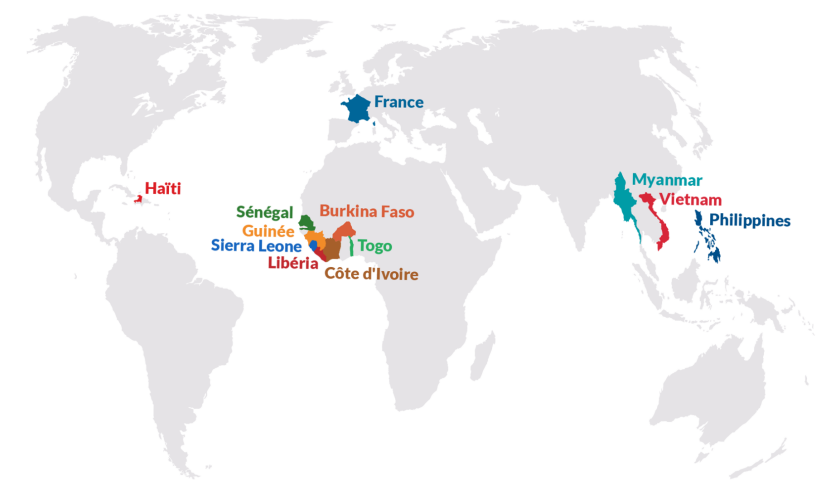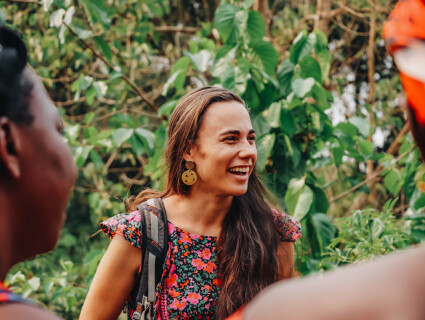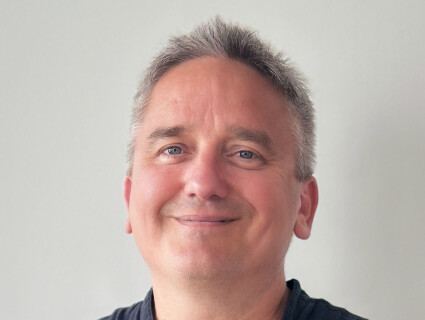
The main focus of our work in 2024
In a world shaken by geopolitical tensions, climate change, and growing inequality, in 2024 we focused on adaptation and innovation to continue our mission of supporting the most vulnerable in achieving economic independence.
Contents
In 2024, 165,000 micro-entrepreneurs, 89% of whom were women, received support in 12 countries through our 21 incubated social enterprises. This groundwork has been recognized and supported by the French Development Agency, with whom we have signed a Multi-Year Partnership Agreement.
The fight is not over. Faced with the reduction of official development assistance in several European countries, it is essential to defend international solidarity with determination. Economic empowerment is a priority issue for world peace. You know this, and your support is invaluable in helping us continue our work with this goal in mind

Economic and social inclusion
In 2024, in Haiti, Burkina Faso, and Myanmar, we helped our local teams, faced with extreme security and economic conditions, to adapt their actions in order to continue supporting as many entrepreneurs as possible.
In Liberia, we sparked a glimmer of hope by launching a social microfinance program. This country is one of the poorest in the world: 70% of its population lives in poverty and 90% of its population works in the informal sector.
We chose to set up our activities in the rural areas of the north of the country, in Zorzor and Gbarnga, because they are particularly disadvantaged and home to a large part of West Africa’s forest, which must be preserved by supporting the communities that live there.
By the end of 2024, after six months of activity, we were already supporting more than 1,600 beneficiaries with training and technical agricultural support. Gradually, they are also gaining access to savings and credit services.

« By supporting marginalized people who start businesses, we significantly increase their chances of success in their trade, workshop, or agricultural production, and thus of becoming self-sufficient and lifting their entire families out of extreme poverty! »
Sustainable agriculture and food security
In 2024, we supported 37,217 farmers by offering them loans tailored to agricultural cycles, training in agroecology in the form of field schools and advice on plots of land, to improve agricultural practices, produce natural fertilizers and pesticides, preserve water and soil, etc. This type of agriculture, developed in collaboration with farmers’ expertise, is inexpensive and adapted to local conditions. It strengthens resilience to climate phenomena.
We also promote the sale of produce within the country. We have built granaries in Senegal, in the Sahel region, to store part of the onion harvest and sell it over several months. In Guinea, we have set up a pilot project involving two school canteens to sell the harvests of the farmers we support and provide students with healthy food.
In Burkina Faso, we facilitate connections between our beneficiaries in rural and urban areas. Finally, we train young people in sustainable agriculture and negotiate with local authorities to make plots of land available to help them get started

« Family farming accounts for up to 80% of food production in Africa. It is therefore the foundation of food security for all. We strongly support small-scale farmers! »
Clean and affordable energy
In 2024, we have:
- Equipped 20,161 families, 25% more than in 2023;
- Selected and deployed new high-quality equipment (Burkina Faso, Philippines);
- Strengthened our gas distribution capabilities and supported the production of clean cooking equipment (Haiti, Togo);
- Trained and supported village committees and regional operators in the management and operation of solar microgrids (Philippines);
- Certified 38,000 carbon credits to finance our actions to promote access to energy (Togo);
- Developed new distribution and financing networks (Togo, Burkina Faso);
- Helped FANSOTO select the right model of improved stove and contract with the right supplier;
- Supported MUNAFA in its feasibility study and subsequent testing to introduce a range of locally manufactured improved stoves;
- Supported MUNAFA in its feasibility study and subsequent testing to introduce a range of locally manufactured improved stoves

« We facilitate access to energy-efficient and safe lighting and cooking equipment for families experiencing energy poverty. This improves their living and working conditions, their health, and their impact on the environment. »
Adaptation to climate change
Droughts are becoming more frequent and longer. The heat does not always subside at night. This causes distress for both humans and plants. Rainy seasons are shorter and more erratic. Typhoons are becoming more frequent. Water reserves are not being replenished; on the contrary, floods are washing away homes, fertile soil, and crops.
Key learning opportunities and dedicated programs
To preserve water resources, we train and encourage agroecological practices, such as:
- Installing stone barriers that follow contour lines to limit erosion, promote infiltration, etc.;
- Using compost to improve soil structure and water retention capacity;
- Planting shrubs around plots to protect crops from drying winds and promote deep water infiltration through the root system.
To preserve forest cover, we have:
- Facilitated the acquisition of cooking stoves that reduce wood consumption (Haiti, Burkina Faso, Togo, Senegal);
- Prioritized our developments in areas with ecosystems that need to be protected. We have opened an office in the Moussaya area (which will become Guinea’s first national park) and launched a program in Liberia, which is home to 40% of West Africa’s forests.
« The consequences of climate change are already tangible and alarming in the countries where we operate. They exacerbate the vulnerability of the people we support. We are therefore putting strong measures in place to raise awareness and help them adapt. »
Women’s empowerment
89% of our beneficiaries are women. Each of our services is a lever of power.
- Saving means being able to buy back stock, save for school fees, pay for medical care for yourself or your child.
- Borrowing means being able to invest in production equipment, having cash flow for purchases, becoming more important in the eyes of suppliers, and obtaining wholesale prices.
- Training means being able to strengthen one’s skills. It also means becoming aware of one’s rights and reacting in cases of abuse. It means becoming a strong entrepreneur and an assertive woman.
- Participating in a group means being able to help each other, gain self-confidence, and be stronger together.
- Access to modern and efficient cooking or lighting equipment means being able to live and work.
- Access to a social worker means being able to break out of isolation and powerlessness when additional difficulties arise (domestic violence, divorce, education, etc.).
- Access to mutual health insurance means being able to seek treatment before the situation worsens.
- Access to reusable menstrual health products means being able to work without having to leave early.
- Support in agricultural activities means being able to reduce the drudgery of work, increase yields, and build resilience to climate change
« Our work aims to empower the poorest members of society. Women make up the vast majority of this group. They are determined and resilient in their efforts to escape poverty, but they face many obstacles. We strengthen their ability to overcome these obstacles so that they can succeed, integrate into society, express themselves, and make decisions. »
